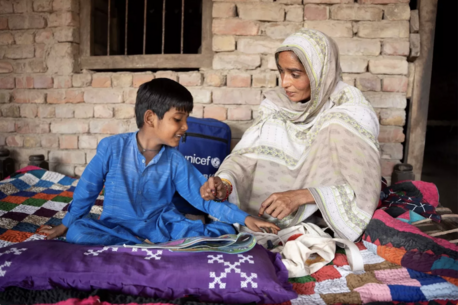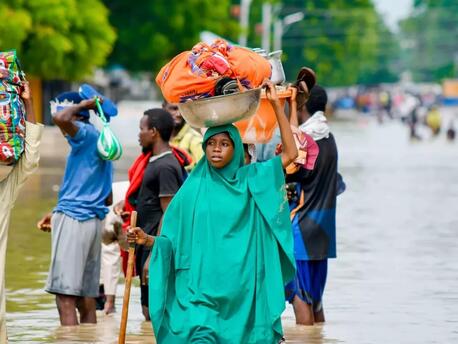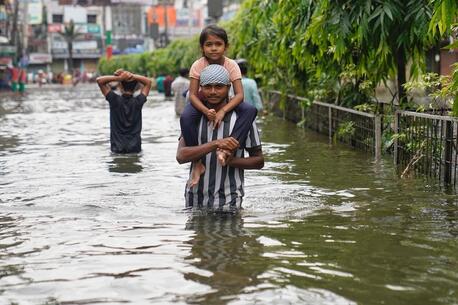
A Bag Full of Hope for Children Recovering From Trauma
UNICEF psychosocial support kits help children like 7-year-old Ehsan cope with overwhelming stress and trauma.
During and after any disaster, children are the most vulnerable
Shaheed Benazirabad, Sindh: Sometimes, 7-year-old Muhammad Ehsan seems to silently stare at a nothingness only he can explain. If only he could. “No one should see what my innocent boy had to witness,” Ehsan’s mother, 32-year-old Rehana, says in a broken voice as tears roll down her cheeks.
If you see Ehsan from a distance when he is playing with his friends and peers, you will not be able to guess the strength and resilience he has shown in getting here.

The shock of sudden tragedy
In July 2022, Ehsan’s home in Syed Ibrahim Shah village was hit by the massive floods that covered one-third of Pakistan, affecting more than 30 million people – over half of them women and children. Ehsan’s family had to seek shelter on the nearest higher ground to escape the deadly floodwaters. They were surrounded by villagers running from the flood. Ehsan’s younger siblings stayed close to their mother as he and his brother Farhan, a year older than Ehsan, rushed to follow their father to safety across some railroad tracks.
Amid the chaos, the two young boys became separated from the rest of the family and had to make it over the tracks all by themselves. Suddenly, a train sped through. All Rehana and her husband, Muhammad Mithal, could see in the aftermath of the roaring engine and train cars passing by was a shaken Ehsan standing alone beside the track.
“No yelling could bring Farhan back,” says Rehana. He was no more.
Within weeks, 7-year-old Ehsan lost the ability to speak and hear
Ehsan was never the same again. Within a few weeks, the child whose joyous energy often led his mother to believe that he was going to be the most mischievous one lost his ability to speak and hear. “If we were not struggling to survive, I would have paid more attention to Ehsan’s condition,” Rehana recalls. By the time the family came out of mourning Farhan’s loss, Ehsan’s condition had deteriorated.
"I would often find him just still, almost breathless." — Rehana, mother of Ehsan, 7
“The doctors said his brain is dark now. They said his nerves have blackened,” Rehana says, trying to describe what the doctors told her. The effect of the trauma was so profound that Ehsan even lost the energy to be a child. “I would often find him just still, almost breathless,” she recalls.
A month later, villagers slowly returned to their homes. One day, the community was gathered by a few visitors. “They said they were from UNICEF,” Rehana shares as she speaks about her first encounter with UNICEF-supported teams working in flood-affected areas to help children cope with the effects of the disaster. “They spoke about mental health and how to deal with stressed children.”

UNICEF psychosocial support kits are packed with toys, games and art supplies to calm and engage children as they begin to heal
These UNICEF-deployed teams from partner organizations with expertise in child psychology and counseling visited village after village in flood-affected areas. With psychologists on board, the teams were equipped with subject knowledge and UNICEF-provided psychosocial support (PSS) kits – bags procured with generous funding from DP World, a leader in global end-to-end supply chain logistics headquartered in the United Arab Emirates. Also known as Happy Family Kits, the bags are packed with tools to give children ages 3 to 17 some joy and a way back from the anguish they've experienced.
Designed to help children cope with the impact of the floods and to assist parents and caregivers in engaging with children through play and fun, the kits contain guidance books, board games, toys, and playdough, along with items to encourage children's interest in physical activities: a skipping rope, tennis balls, etc. The materials in the kits target different elements of children's well-being and development: family connection, stress management, creativity and focus, and physical exercise.
“If not for this bag and the sessions, my son would have further drowned into silence.” — Rehana
The teams held special sessions engaging community members on strategies for protecting children from all forms of violence, exploitation, abuse and neglect. The sessions also covered mental health, explaining the need and sharing guidance to address children’s mental health challenges.
Following the initial session, Rehana sought assistance from the UNICEF-supported project team for Ehsan. Child protection caseworkers promptly met with Ehsan, providing his family with a PSS kit. They also guided Rehana on how to interact with Ehsan and address his needs as a child coping with trauma. Rehana says, "The kit was a bag full of hope for us."
Regular play sessions ensued, and Ehsan's energy gradually returned. Although he can now read his mother's lips and communicate in limited words, doctors recommend a hearing aid to manage his condition. “If not for this bag and the sessions, my son would have further drowned into silence,” says Rehana.

Now, Ehsan plays with other children in his village. He wants to go to school. But schools for children with special needs are not easily accessible in Pakistan, especially in rural communities, like the one where Ehsan and his family live. There is also the concern about his hearing.
Rehana and Muhammad Mithal, despite their modest income of less than $50 a month, are diligently saving to acquire the costly hearing aid that will help Ehsan continue to thrive. "I will do whatever is in my power to ensure my child's well-being," says Rehana.
UNICEF works in 190 countries and territories around the world to ensure every child has the opportunity to reach their full potential. Your contribution can made a difference. Please donate.
This story is adapted from UNICEF.org
HOW TO HELP
There are many ways to make a difference
War, famine, poverty, natural disasters — threats to the world's children keep coming. But UNICEF won't stop working to keep children healthy and safe.
UNICEF works in over 190 countries and territories — more places than any other children's organization. UNICEF has the world's largest humanitarian warehouse and, when disaster strikes, can get supplies almost anywhere within 72 hours. Constantly innovating, always advocating for a better world for children, UNICEF works to ensure that every child can grow up healthy, educated, protected and respected.
Would you like to help give all children the opportunity to reach their full potential? There are many ways to get involved.




